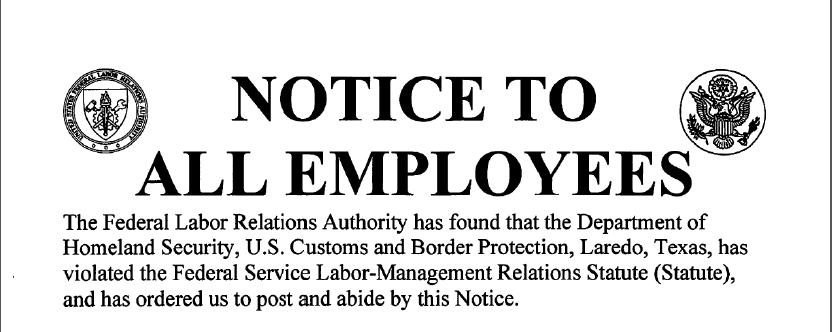FLRA Administrative Judge finds that OPR Special Agents violated employee rights and Federal Law

Laredo, Texas – Check out the Unfair Labor Practice (ULP) case below that was filed by Local 2455 on behalf of Laredo Sector bargaining-unit employees whose Weingarten Rights were violated by Special Agents John Banken and Travis Anderson from the Office of Professional Responsibility (OPR). The case was filed by the Union with the Federal Labor Relations Authority (FLRA) which has oversight responsibility over the Federal Service Labor-Management Relations Statute under 5 USC Chapter 71.
In the case below, three Border Patrol Agents were denied the right to Union Representation by OPR Special Agents. On the day of the investigatory interviews, the Border Patrol agents requested union representation, and Travis Anderson, the lead OPR agent, denied each request. The OPR Special Agents in this case asserted that the BPA’s being investigated were not entitled to union representation since they were listed as witnesses in the agency investigation. The union representative in this case attempted to reason with OPR, but the special agents opted on violating the employee rights and federal law.
“Local 2455 hopes that OPR Special Agents John Banken and Travis Anderson are held accountable for deciding to violate employee rights and for their disregard for Federal Law!”
– Hector Garza, President Local 2455
See the Posting by clicking here: Notice to All Employees
###
Department of Homeland Security, U.S. Customs and Border Protection, Laredo, Texas and American Federation of Government Employees, National Border Patrol Council, Local 2455
This is an unfair labor practice (ULP) proceeding under the Federal Service Labor-Management Relations Statute (the Statute), Chapter 71 of Title 5 of the U.S. Code, 5 U.S.C. §§ 7101-7135, and the Rules and Regulations of the Federal Labor Relations Authority (the Authority or FLRA), 5 C.F.R. part 2423.
Ruling
An FLRA administrative law judge ruled that the agency violated employees’ Weingarten rights when agents from its Office of Professional Responsibility (OPR) denied union representation at investigatory interviews.
Meaning
Employees’ belief that investigatory interviews could result in disciplinary action against them is reasonable when the employees wait too long to report an incident and then offer differing accounts of what occurred.
Case Summary
An incident was reported to management involving several border patrol agents. In the agent’s report, he listed a bystander and a third agent as witnesses, but the third agent maintained that he didn’t see the incident. The agency’s Office of Professional Responsibility opened an investigation and the employees were reportedly afraid that they would be asked why they failed to immediately report the incident, and about their differing accounts of what occurred. At the interviews, the OPR agent denied each employee’s request for union representation.
The union alleged a violation of the Weingarten right. The ALJ determined that the employees’ belief that the interviews could result in disciplinary action against them was reasonable under the circumstances, and that, accordingly, the agency violated the statute. He ordered the agency to stop making Weingarten violations and to post a notice.
The ALJ determined that the central issue was whether the employees reasonably believed that the interviews might result in disciplinary action against them. Because the employees reasonably believed that the examinations could involve questioning about their conduct during the incident and about why they failed to immediately report the incident, and because all three agents reasonably believed that their differing accounts could lead OPR to suspect at least one of them was speaking untruthfully, the ALJ found that all three agents reasonably believed that the interviews might result in disciplinary action against them.
The ALJ acknowledged that the OPR offered immunity to the bystander. However, the offer of immunity was “too ambiguous and informal” to offer the bystander a true guarantee of protection, so the bystander’s belief of possible discipline was also reasonable.
See the Posting by clicking here: Notice to All Employees
